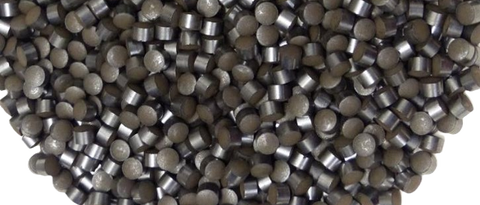SYNSPIRE® Methanol
SYNSPIRE® Methanol Catalysts: Flexible, Future-Ready Solutions for Sustainable Methanol Production
BASF’s SYNSPIRE® Methanol catalyst portfolio is engineered to meet the evolving demands of methanol production - whether from conventional syngas or renewable feedstocks. With a focus on reducing the Product Carbon Footprint (PCF), our catalysts are specifically designed for renewable methanol synthesis.
Why Choose BASF SYNSPIRE® Methanol Catalysts?
-
Flexible Feed Compatibility: Suitable for both grey and green methanol pathways
-
Sustainability-Driven: Designed to reduce PCF and support climate goals
-
Proven Stability: Demonstrated long-term performance under industrial conditions vs. state-of-the-art market catalysts
-
Global Expertise: Backed by BASF’s legacy in catalyst innovation and process integration
-
OPEX Reduction: Optimized shape enhances heat transfer, reduces pressure drop by 15 - 30 % compared to standard tablets, and maximizes productivity
-
Optimized for Carbon Footprint Reduction: Enables full CO₂ feed in methanol synthesis with minimized by-product formation
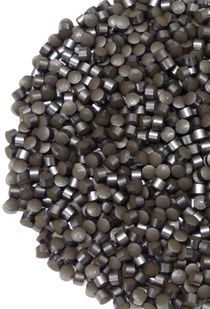
As the methanol market evolves towards blue methanol, biobased methanol, and e-methanol by 2040, BASF has introduced the SYNSPIRE® Methanol Catalyst portfolio. These catalysts are designed for changing feedstocks and increased CO2 utilization, with the Product Carbon Footprint (PCF) as the key driver.
The SYNSPIRE® Methanol VARIO catalyst, launched in 2021, is engineered for CO2-enriched environments and has proven its performance across diverse feedstocks. With the market for eMeOH expected to surge post-2030, BASF developed the SYNSPIRE® Methanol ZERO catalyst, ensuring unmatched performance in eMeOH conditions. This development is based on extensive testing at hte GmbH and trials at BASF and partner labs, confirming the reliability and efficacy of the catalysts, , which has led to the most important technology providers qualifying the SYNSPIRE® Methanol Catalysts for their respective methanol synthesis technology.
Partner with BASF to experience unparalleled performance with SYNSPIRE® Methanol Catalysts and discover the advantages of BASF’s advanced technology for a sustainable and profitable future in methanol production.

** Feed composition in Make-up-Gas (MUG)
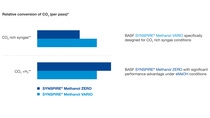
SYNSPIRE® Methanol VARIO and ZERO: Innovative Catalysts for Diverse Applications
The SYNSPIRE® Methanol VARIO and SYNSPIRE® Methanol ZERO are two advanced methanol catalysts designed for distinct applications in the production of methanol.
SYNSPIRE® Methanol VARIO
Introduced in 2021, SYNSPIRE® Methanol VARIO is specifically tailored for syngas, particularly in CO₂-rich environments. This catalyst is ideal for a wide range of feedstocks, including PCF-optimized methanol plant concepts, as well as bio, blue, and grey methanol. It offers high conversion efficiency under flexible feed conditions and robust performance across various CO₂/H₂ ratios, making it suitable for hybrid and transitional methanol plants.
SYNSPIRE® Methanol ZERO
Launched commercially in 2024, SYNSPIRE® Methanol ZERO is optimized for the production of eMethanol using CO₂ and green hydrogen. This catalyst delivers exceptional methanol productivity under eMeOH conditions, outstanding hydrothermal stability, and proven performance over an extended lifetime.
These innovative catalysts represent BASF's commitment to advancing methanol production technologies and supporting the transition to sustainable energy solutions.
| SYNSPIRE® Methanol VARIO | SYNSPIRE® Methanol ZERO | |
| Target application | CO2 rich feeds, PCF optimized MeOH plant concepts, bio & blue MeOH as well as grey MeOH | eMeOH: CO2 and eH2 feed |
| Year of commercial introduction | 2021 | 2024 |
| Description and Benefits | Tailored for syngas and especially for CO2-rich syngas environments | Optimized for eMeOH production using CO₂ and green hydrogen |
| High conversion efficiency in flexible feed conditions | Superior COx conversion under eMeOH conditions | |
| Robust performance across a range of CO₂/H₂ ratios | Outstanding hydrothermal stability | |
| Ideal for hybrid and transitional methanol plants | Proven performance over an extended lifetime. | |
More than 100 Years of History and Still Counting
BASF developed the first industrial methanol process in 1923, using gasified wood feedstock and a zinc chromite catalyst (300-400°C, 300 atm).
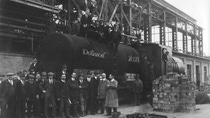
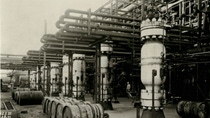
Modern methods use copper zinc catalysts at 200-300°C and 30-100 atm. The reaction network comprises the following reactions:
3 H2 + CO2 ⇔ CH3OH + H2O ΔHR = - 49.5 kJ/mol
2 H2 + CO ⇔ CH3OH ΔHR = - 90.8 kJ/mol
H2 + CO2 ⇔ CO + H2O ΔHR = + 41.3 kJ/mol
BASF is now proudly introducing its new methanol catalyst portfolio suitable for contemporary feedstocks, reconnecting to its historical roots.
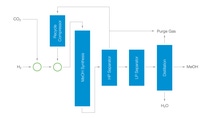
HP: High-Pressure
LP: Low-Pressure
